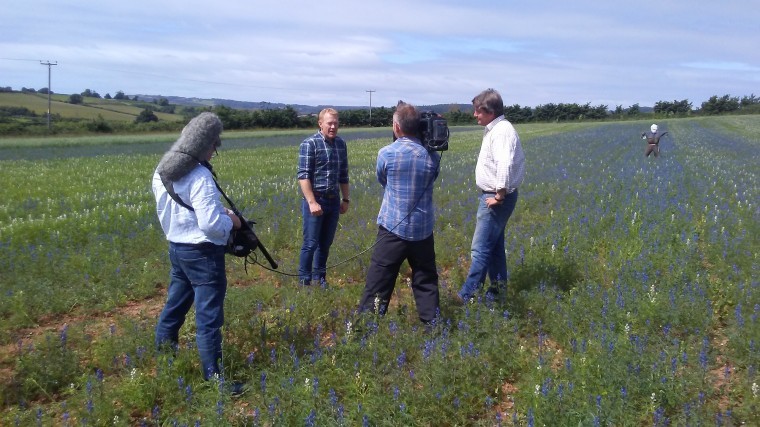Homegrown organic lupins could provide farmers with an “exciting” alternative to soya, according to BBC One’s Countryfile presenter, Adam Henson, who visited one of the Mole Valley Farmers’ organic lupin trial plots.
Adam went to see one of five Innovative Farmers Field Labs being run by Mole Valley Farmers in conjunction with The Soil Association, to explore the role of lupins on British soils.
He explained how British farmers were largely reliant on importing 800,000t of organic and conventional soya a year to provide livestock with a high protein feed, which created huge environmental concerns.
“As global demand for soya grows, increased production in South America and Asia is leading to deforestation and lack of biodiversity,” he explained.
Consequently, Mole Valley Farmers are in the middle of a two year trial looking at the practicalities of growing lupins on British farms as a source of homegrown, organic protein. One of the five farms involved in this year’s project is Stantyway Farm on the Clinton Devon Estate in Devon, which was the host for Sunday’s Countryfile programme.
Standing in a crop of bright blue flowers Adam said: “The beans from these beautiful flowers are just as good as soya beans and could help reduce our reliance on imported soya.”
Farmer, Sam Walker – who is growing 1ha of the crop at Stantyway Farm – was in agreement with Adam. He also said that the crop could provide him with an additional source of income, whilst also building soil fertility as part of his organic crop rotation.
“Lupins are incredible because they’re a real mixture of being a cash crop and actually fixing nitrogen in the soil to help crops grow,” he said.
Mole Valley Farmers’ Nigel Mapstone – who is running the organic lupins trials – then explained to viewers how nodules on the plant’s roots helped fix nitrogen from the air and put nitrogen back into the soil. At the same time, at 33% protein, the crop was the highest protein bean that could be grown in the UK. Farmers could subsequently grow and feed the crop or sell it into the organic feed market.
Nigel added: “It should give a return similar to that of organic wheat or oats. But because it’s a legume and it’s putting nitrogen back into the soil, it’s actually got the advantage, that it’s giving rather than just taking. But it will mean that we’ve got a proper, UK grown product….The way this is looking at the moment, I think they could be the answer our prayers.”
Adam was equally as enthusiastic and informed viewers that initial signs from the trial looked “promising” and that the crop could offer exciting opportunities in the future.
He said: “I’m keen to find out how the trials progress, because if Sam can produce his own protein to feed his cattle from these lupins, and have some spare to sell over into the open market, that becomes very exciting. But if the trials can then be widened out into the conventional farming market, and we can be less reliant on imported soya, then everyone’s a winner.”
Catch up on the BBC’s Countryfile programme on the BBC iPlayer.




